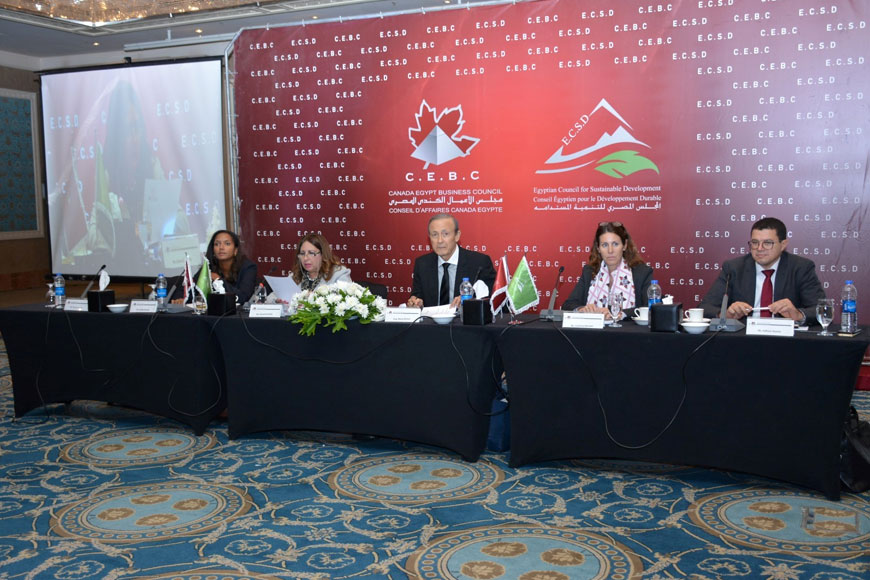
Date
Speaker(s)
Ms. Sandra Kassab
Mr. Adham Azzam
Ms. Hanaa El Helaly
Presentation
Description
Over the past years, Egypt has suffered from violent energy crises that have hit many sectors of the economy, until the government has adopted an ambitious strategy to meet all the required needs; through establishing and expanding new and renewable energy projects. The International Financing Institutions have played a prominent role in Egypt’s success in eliminating energy crises by supporting and financing several projects. In this context, Canada Egypt Business Council and the Egyptian Council for Sustainable Development organized an event with Ms. Catarina Hansen, Deputy Head European Bank for Reconstruction and Development; Ms. Sandra Kassab, Senior investment officer Agence Française de Développement; Mr. Adham Azzam, Senior Investment Officer International Finance Corporation & Ms. Hanaa El Helaly, United Nations Expert for Sustainable Development.
In the opening remarks, Eng. Motaz Raslan welcomed all the guests and members and thanked them for always supporting CEBC events and activities, then he mentioned that this event comes within the framework of creating an acquaintance for businessmen, especially in the field of energy and the role of banks and international financial institutions in this important sector. As for the past years, Egypt has suffered several crises in the energy sector especially in the field of electricity; which almost affected most sectors of economy and the state as a whole. Today, the Egyptian government has developed an ambitious strategy to secure all needs of the country, through the establishment of giant stations and the expansion of new and renewable energy projects, noting that these institutions have positive outlook towards the future of energy in Egypt.
Mr. Adham Azzam, IFC Investment Officer, pointed out that energy production costs have dropped by 50% in the energy market in Egypt, and there are significant developments on gas generation especially in the region of North Africa. He added that Egypt has overcome the issue of power-cuts, which is a result of the current boom in the energy sector, noting that most of the countries in the region have great ambitions to switch to new and renewable energy instead of the gas-generation. He pointed out that the coming wave holds many options and opportunities for Egypt, especially after the current reforms which entails a lot of private investment and opportunities in the energy sector where there was significant cooperation between Egypt and the World Bank in this area.
Mr. Azzam further explained that the decision of the Central Bank to float the Egyptian pound had a significant impact on energy prices, pointing out that the recent decisions taken will have positive effects for attracting more investments especially in the energy field. He mentioned that there are stations in Egypt that have not been updated 25 years ago, which is a sort of attraction for new investments, especially by the private sector. And considering the exchange rates in Egypt, new solutions to overcome the issue of foreign exchange are being studied, taking into consideration the possibility of any potential risks.
Ms. Catarina Hansen, Vice President of the European Bank for Reconstruction and Development, said that the bank has been operating in Egypt for nearly four years, and Egypt is one of the bank’s founding countries. The bank has carried out a number of projects during the past period that worth up to 300 million dollars, and it is currently implementing several projects especially in the field of infrastructure. Also, the bank provides technical consultancy for many projects, in addition, to supporting a large number of companies in the private sector in cooperation with the International Finance Facility and the French Development Agency. They are also looking forward to executing a number of projects in the Gulf of Suez to improve the performance of the sector. She further mentioned the importance of the new gas law in Egypt, especially at this stage, and she also illustrated that the bank is conducting a technical evaluation of gas networks in Egypt, to ensure that all projects are compatible with environmental requirements.
Ms. Hansen added that after the floatation of the Egyptian currency, there have been some disturbance, but now we have gained our confidence back, both by international organizations such as the state bank, and by foreign companies too towards the financial sector in Egypt. The size of the projects in Egypt is very large and needs considerable financial support, so the bank is cooperating with many international institutions. Although the current interest rate is very high compared with many of the surrounding countries, but project financing is still ongoing. She discussed one of the planned strategies which is to look outside Cairo, as the employment and participation of the youth in these projects is important. Also, the bank is interested in providing support to small and medium-sized enterprises, including entrepreneurship projects, noting that this financial support comes both from the European bank directly or by local banks.
Ms. Sandara Kassab, Project Officer, French Development Agency, said that their activities in Egypt have ranged from infrastructure work in energy and transportation to social protection. Last year, they celebrated 10 years of work in Egypt, where they have worked with companies and non-profit organizations as well as the local working groups. In 2009, they started their work in the field of transportation. The French Development Agency is working to support the government’s development strategy. They started a budget support for the program this year, and they are providing funding in cooperation with their partners in Europe.
Ms .Kassab pointed out that the French Agency has become interested in the field of energy, especially the new and specific energy. A 250 MW wind power project has been established in the Suez Canal area. They are working to increase energy efficiency, provide financial support for useful initiatives, increase the volume of lending to the private sector and provide good governance advice in cooperation with the European Union and the World Bank.
The floor was then opened for questions and answers where several ideas and suggestions were discussed for developing energy renewal projects and overcoming the current issues.















